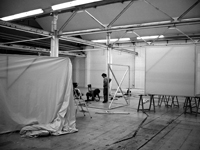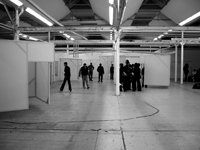(PDF 485 KB ![]() )
)



Intro
This little book is the outcome of a workshop held at the Shedhalle, Zurich in December 2002. It is not the kind of book that would, with an explosion, destroy all other books in the world – to quote Wittgenstein’s metaphor for true ethical insight. However, it does intend to touch on matters of an ethical character.
The focus of the book, as of the exhibition project that gave rise to it, is on discrepancies between the values we profess for society at large and our disposition to put these values into practice in our own everyday lives. It is crucial to understand that this disposition must be seen in the larger perspective of one’s access to economic, educational, social, and cultural resources, and to the decision-making processes of the political system one happens to be living in.
Where there is behavior, there is education – a process of forming patterns of thinking and reacting. While education helps us understand and survive, it also makes us vulnerable to the mechanisms of control. If we refuse to submit ourselves to these mechanisms we are forced to look at the discrepancies between, on the one hand, the material conditions and social dependencies and, on the other, our greediness for knowledge, popularity, beauty, information, riches, power and personal comfort.
Ethics is a slippery plane where moral and immoral are often just a small step apart. Any effort to call existing concepts into question readily combines with the thrill of the new. Together, the attack on the old and the kick of the new make up the immoral force that will install the next system of concepts on which the next elite will surf.
The workshop at the Shedhalle was held by Alain Kessi and Dimitrina Sevova and was part of a larger exhibition project curated by Frederikke Hansen. It started out with the presentation of the international electronic and media art project Communication Front and the homonymous book (http://www. cfront.org) and went on to discuss perceptions of ethical and cultural questions in Eastern and Western Europe in the light of differences in material and historical conditions as well as in the status of institutions.
The title of the exhibition project is Konsequenz – a German word referring to staunchness and the consistency between personal ethics and actual behavior. Even if this book adopts the title of the project and features various works from the exhibition it is not a documentation of the Konsequenz project. The exhibition is carefully documented in the catalog Shedhalle 2002. This book further explores the subject matter of the exhibition and sets out to discover visual and textual fragments towards a new approach to the question of Konsequenz.
For this volume we are indebted to everyone who contributed to the Konsequenz project. We would like to thank the visitors of Shedhalle who fi lled in the personal ethics poll and posed in front of our Polaroid camera, the artists, curators and theorists who joined us live for the phone interviews, and the women of the housing project “Goldregenweg” who agreed to share their experiences with and reflections on gender and communal living. Likewise we thank Group Bardo for sharing their experiences with poverty and the power of body and mind.
Our special thankfulness and appreciation reaches out to Mascha Madörin for the insightful interview as well as to Corinne Gerber who helped doing it, David Shrigley for his witty drawings and Ingo Niermann for letting us have his thought-provoking interview with filmmaker Hiroshi Shinomiya.
Last, but not least, ‘big shouts’ to Yolanda Hug and Sarah Mehler for their practical assistance and patience, to Emil Miraztchiev for his work on the documentation and for getting the book printed, and to Yavor, Andreas and Alex for bravely holding out when their parents got swallowed by a little book.
Frederikke Hansen, City of Berlin
and Alain Kessi and Dimitrina Sevova, Village of Glattbrugg
November 2004